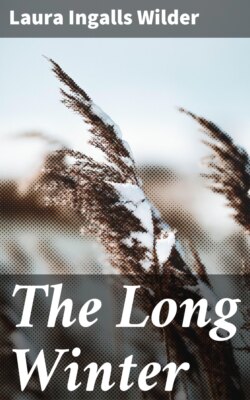Читать книгу The Long Winter - Laura Ingalls Wilder - Страница 9
6. INDIAN SUMMER
ОглавлениеThere were only slivers of ice on the water pail next morning and the day was sunny and warm. Pa took his traps to set them for muskrats in Big Slough, and Carrie and Grace played outdoors.
The little auk would not eat. It did not utter a sound, but Carrie and Laura thought that it looked up at them desperately. It would die without food, but it did not seem to know how to eat anything that they offered it.
At dinnertime Pa said that the ice was melting on Silver Lake; he thought that the strange little bird could take care of itself on the open water. So after dinner Laura and Mary put on their coats and hoods and they went with Pa to set the little auk free.
Silver Lake was ruffling pale blue and silver under the warm, pale sky. Ice was around its edges and flat gray cakes of ice floated on the ripples. Pa took the little auk from his pocket. In its smooth black coat and neat white shirt-front of tiny feathers, it stood up on his palm. It saw the land and the sky and the water, and eagerly it rose up on its toes and stretched out its little wings.
But it could not go, it could not fly. Its wings were too small to lift it.
“It does not belong on land,” said Pa. “It’s a water-bird.”
He squatted down by the thin white ice at the lake’s edge and reaching far out he tipped the little bird from his hand into the blue water. For the briefest instant, there it was, and then it wasn’t there. Out among the ice cakes it went streaking, a black speck.
“It gets up speed, with those webbed feet,” said Pa, “to lift it from the ... There it goes!”
Laura barely had time to see it, rising tiny in the great blue-sparkling sky. Then, in all that glittering of sunlight, it was gone. Her eyes were too dazzled to see it any more. But Pa stood looking, still seeing it going toward the South.
They never knew what became of that strange little bird that came in the dark with the storm from the far North and went southward in the sunshine. They never saw nor heard of another bird like it. They never found out what kind of bird it was.
Pa still stood looking far away across the land. All the prairie curves were softly colored, pale browns and tan and fawn-gray and very faint greens and purples, and far away they were gray-blue. The sunshine was warm and the air hazy. Only a little cold was around Laura’s feet, near the thin, dry ice at the lake’s edge.
Everything was still. No wind stirred the gray-bleached grass and no birds were on the water or in the sky. The lake faintly lapped at the rim of that stillness.
Laura looked at Pa and she knew he was listening too. The silence was as terrible as cold is. It was stronger than any sound. It could stop the water’s lapping and the thin, faint ringing in Laura’s ears. The silence was no sound, no movement, no thing; that was its terror. Laura’s heart jumped and jumped, trying to get away from it.
“I don’t like it,” Pa said, slowly shaking his head. “I don’t like the feel of the weather. There’s something ...” He could not say what he meant and he said again, “I don’t like it. I don’t like it at all.”
Nobody could say, exactly, that anything was wrong with that weather. It was beautiful Indian summer. Frosts came every night and sometimes a light freeze, but all the days were sunny. Every afternoon Laura and Mary took long walks in the warm sunshine, while Carrie played with Grace near the house.
“Get yourselves full of sunshine while you can,” Ma said. “It will soon be winter and you’ll have to stay indoors.”
Out in the bright soft weather they were storing up sunshine and fresh air, in themselves, for the winter when they could not have any.
But often, while they were walking, Laura quickly looked at the north. She did not know why. Nothing was there. Sometimes in the warm sunshine she stood still and listened and she was uneasy. There was no reason why.
“It’s going to be a hard winter,” Pa said. “The hardest we ever saw.”
“Why, Charles,” Ma protested. “We’re having fine weather now. That one early storm is no reason why the whole winter will be bad.”
“I’ve trapped muskrats a good many years,” said Pa, “and I never saw them build their walls so thick.”
“Muskrats!” said Ma.
“The wild things know, somehow,” Pa said. “Every wild creature’s got ready for a hard winter.”
“Maybe they just made ready for that bad storm,” Ma suggested.
But Pa was not persuaded. “I don’t like the feel of things, myself,” he said. “This weather seems to be holding back something that it might let loose any minute. If I were a wild animal, I’d hunt my hole and dig it plenty deep. If I were a wild goose, I’d spread my wings and get out of here.”
Ma laughed at him. “You are a goose, Charles! I don’t know when I’ve seen a more beautiful Indian summer.”
